#of course I have more to say about he and Laios specifically (she threatened)
Explore tagged Tumblr posts
Note
Hello, op! While I do find your reading of Kabru’s self sacrifice and how little he eats really good, im curious why you consider him the deuteragonist? He is a foil to the protagonist yes, but still a supporting character.
I think its pretty clear Marcille is the second most important character in DM, and her story has much more weight than Kabru’s.
Hello! I've mentioned this on my blog before, but I actually consider Marcille and Kabru to both be deuteragonists to Laios's protagonist. I just wasn't talking about Marcille in that post.
Technically this term is meant to be used in playwriting, and the Greek tradition at that, so I'm playing a little loosey goosey with semantics and my argument would sound different if I were writing an academic paper. But this is tumblr dot edu and I'm trying to get a point across on my little blog, and part of the idea of a deuteragonist is that they support the protagonist. "Secondary main character who has their own importance in the narrative while bolstering the protagonist" works well enough for my purposes.
I think Marcille and Kabru are both playing specific and complementary roles to Laios. Marcille is at his side, facilitating the A plot: namely, "save Falin", which requires Marcille's magic, and then Marcille's method of resurrection ropes Thistle in, so the continuation of "save Falin" necessitates confronting the Dungeon Lord and conquering the dungeon (the B plot).
Kabru only intersects with Laios, but he is tied from the beginning to the B plot- and with dragging basically everyone else into it. Actually, the fact that he brings in this extremely loaded B plot despite only having brief face time with the protagonist should be seen as significant. In a sense, Kabru represents the surface world and all its concerns.
Before I talk about that more, I want to continue with the complementary line of thinking and point out that Kabru and Marcille have very similar background motivations.
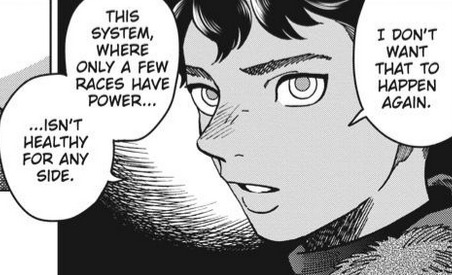

Laios wants to save his sister first and foremost, and it's only along the way that he starts to consider what he'd do with the responsibility of Dungeon Lord. Coming to the conclusion that he wants to create a home for disparate peoples to live in harmony has connective tissue to both Kabru and Marcille's desires.
Marcille is the only one in their party who starts out with a greater motivation other than saving Falin (Izutsumi is a special case, but she's ultimately along for the ride), one that she keeps hidden for a long time. Because she is a mage, and because she is driven by a very personal tragedy (my dad died; I am terrified of outliving everyone), she is looking for a miracle to bring the different races closer together.
Kabru comes from a background of personal tragedy as well, but it's also a far greater, more political tragedy than just the death of a parent. It is not a coincidence that Kabru is a brown boy from an exploited region that suffered despite and because of military intervention from a first-world power, nor that he was adopted by a white woman whose coddling/dehumanization of him represents the paternalistic oversight of these world powers.
Thus, Kabru's motivations are both personal and political: if they, the short-lived races, can finally access the secrets of the dungeons, then not only can they have agency in stopping tragedies like Utaya's, but it will also give them a greater power of self-determination.
Marcille and Kabru have both correctly identified and set themselves against a problem that is greater than saving the life of one girl, greater even than sealing this one dungeon.
Despite Marcille's hopes, there is no grand magic solution to this. Only small, slow, backbreaking, ordinary solutions, the kind you labor over in kitchens and bedrooms and throne rooms and meeting houses and hearths and negotiation tables. The kind you run a kingdom with.
There is a reason why Dungeon Meshi ends with Marcille and Kabru on either side of Laios's throne.
Okay: back to Kabru (under the cut).
I've talked about this a little before, but I'll reiterate here: I consider Kabru to be the counterweight to the back half of the story. In a very literal sense too, as he pulls the focus up from the depths to the surface not once, but twice. Dungeon Meshi builds itself on the premise that the traditional "dungeon" must function as an actual ecosystem, and the monsters in it are biological actors in that ecosystem and not merely magical obstacles independent of their environment. The first couple dozen chapters are focused on this. Like regular animals, monsters have needs and instincts and unique behaviors, and they can be killed and consumed as part of a food chain.
And then Kabru comes along and he reminds us that humans are also part of their own special ecosystem, with their own needs and instincts and unique behaviors, and that beyond the biological drive of the literal food chain there are also complex social issues influencing these behaviors (like capitalism). Tansu's visit with the governor introduced us to these ideas, but Kabru is the one who carries them.
The way he and his party break down Laios's party also serves an important function. I think most readers are so busy being shocked that Kabru is "so wrong" about our goofy boy Laios that they don't realize that he isn't actually wrong about anything (he's only missing the context of what drives Laios, which he admits to and is part of the reason why he pursues him). We've gotten only Laios's view of things so far, and Laios is pretty tunnel-visioned. The narrative, through Kabru, is telling the reader this is how our protagonist actually comes across to his community.
We like Laios because we are following his story from his inner circle. We know he's naive and struggles with people but that he has a good heart and is ultimately just a big silly guy who won't harm anybody if he can help it. But we only know that because we're seeing him with his inner circle, in his environment. Outside of the dungeon, Laios is anti-social to the point of rudeness; he misreads situations and misjudges people, he acts in ways that cause friction, and he accidentally aligns himself with people who make his whole enterprise look suspicious: a prominent half-foot community leader, a mysterious foreigner literally surrounded by spies, the disgraced daughter of a criminal who now has to shoulder the burden of her father's reputation, and an elf in a land where there are no elves. And they seem to be very good at what they're doing. Yet this whole time, Laios acts as if he doesn't care about profit or taking the kingdom, the only logical reasons why anyone on the Island would gather up such a party and throw themselves into this death pit day after day.
Yeah of course Kabru finds this suspicious and interesting. Of course people don't know what to make of Laios. This all reiterates the question that Zon the orc already raised: What will you do, Laios, if you defeat the Mad Mage? If you gain control of all of this? Can you be a leader? Laios himself doesn't know yet.
This is all necessary context for our protagonist and the journey he has to go on, and it's fittingly brought up by the most socially adept character, who is so concerned with human ecosystems and the bigger picture of the dungeon. There is a reason why Kabru, as a character, is connected to large webs of people as he moves throughout the narrative: his own party, Toshiro's party, the Canaries, the denizens of the first floor of the dungeon.
Kabru is responsible for bringing Toshiro down to Laios's party. Toshiro is not a big mover and shaker in the story itself, but his confrontation with Laios is a huge part of Laios's character arc. His detour down to the lower levels also allows Izutsumi to escape and join Laios's party later.
We also have this very important moment:
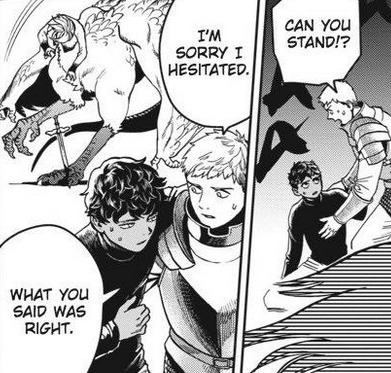
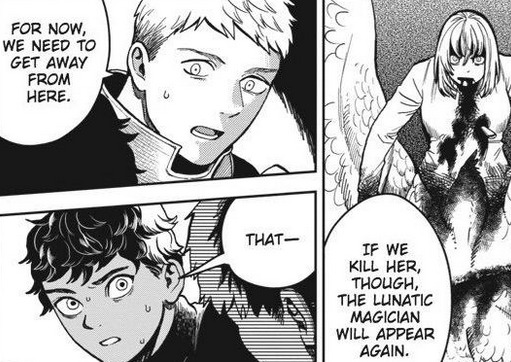
It shows the first inkling- to the audience, to Kabru, and to Laios himself- that Laios is willing to do a painful, necessary thing to protect other people, that he won't just allow them to become collateral for his sister/monsters. That he can listen, and that he can assess a situation beyond his personal feelings. Again, fittingly, big-picture-thinker Kabru is the catalyst for this.
And then, not content to leave him as merely a device for Laios's character growth, the focus slingshots back up to the surface, and we follow Kabru.
The Canaries were going to go into the dungeon soon anyway, and they were always going to stir up the crowd in order to lure Thistle to them. Unless Thistle had given up right then and managed to slip away, the story could have very easily ended here:
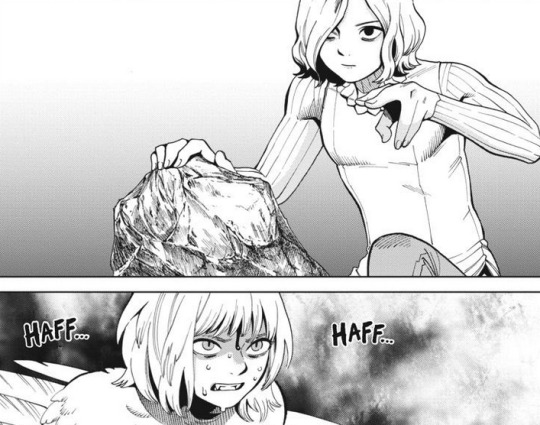
Falin, immobilized and surrounded by Canaries, would have certainly been killed, and there would have been no way to ever resurrect her. Thistle would have been neutralized. The dungeon would have been taken by the elves, and anyone they could get their hands on would have been imprisoned at best. And maybe the dungeon would have been managed safely ... or maybe something would have gone wrong, and more lives would have been lost. Remember: the Canaries arrived in Utaya one year before the tragedy.
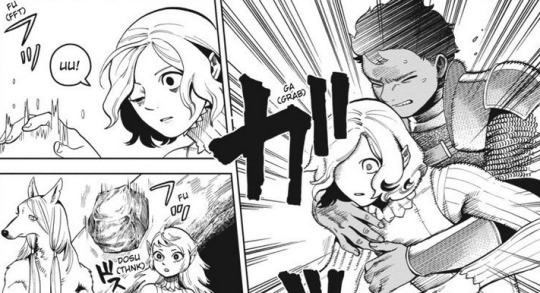
This is a huge moment that changes Laios's life forever, and he doesn't even know it. Kabru single-handedly keeps the story on course by sabotaging the Canaries, and he does it not just for Laios's sake, but for everyone's sake. For his friends and companions in the dungeon and everyone else outside it. Laios is a part of his motivation, a key player in Kabru's hopes, but Kabru has his own desires, his own agenda. He's trying to change the world. In a way, he succeeds. And while the Canaries might wish it were otherwise, as an entity in the narrative they are always anchored to Kabru's character. The two forces collide because of Kabru. The unsealing of the Winged Lion and Marcille's emergency ascension to Dungeon Lord happen indirectly because of Kabru.
While I have talked so much already that I don't want to give a detailed breakdown of it, I do want to mention Kabru's unique interiority as a character. That is to say: we see the inside of Kabru's head more than anyone else. Every character in the main ensemble gets their own moments of inner monologues or fifteen minutes in the limelight, but for Kabru, it's constant. He's always thinking, talking, narrating. His POV chapters always stand out for how first-person they feel compared to most others.
Notably, the only other character I could compare that to is Marcille, specifically during the dungeon rabbit debacle and her ascension afterward, which is when she really takes center stage as a character.
I hope I've explained my reasoning without becoming too insufferable.
To cap off my thoughts with a nod to my original post, I cannot stress enough how significant it is, thematically, that Kabru's relationship with food is the inverse of Laios's. It isn't just that Laios is the main character in a story about cooking monsters and Kabru happens to be his monster-hating foil. The artistic choice to deny the reader the visual of this character ever enjoying food, and only ever putting it in his mouth in situations where it hurts him, in a manga that gives so much attention to eating and the pleasures of meals, cannot be understated.
#Dungeon Meshi#Marcille Donato#Kabru#Kabru of Utaya#Dungeon Meshi meta#Dungeon Meshi spoilers#I started answering this at 10:30 AM but took several detours#mostly I was at work. some people shitpost at work. god knows what I'm doing.#I am so fucking sorry I did not mean for it to be this long. I had to EDIT THIS DOWN#paging malewifesband I feel like this does the trick wrt: Kabru's function in the narrative#of course I have more to say about he and Laios specifically (she threatened)#musings with Dea#I think I'll go back and add image descriptions but it's been eight hours and I need dinner!#and also to play FFXIV#dungeonposting#Dea's anonymous friends
522 notes
·
View notes